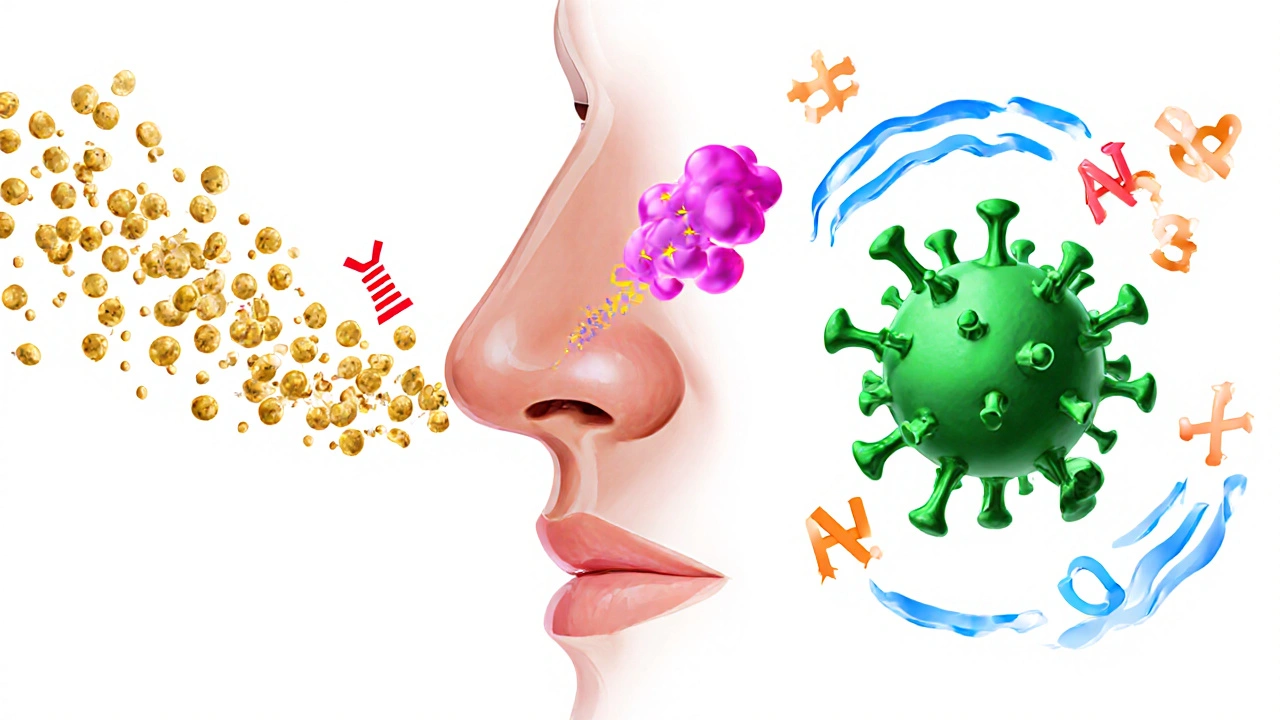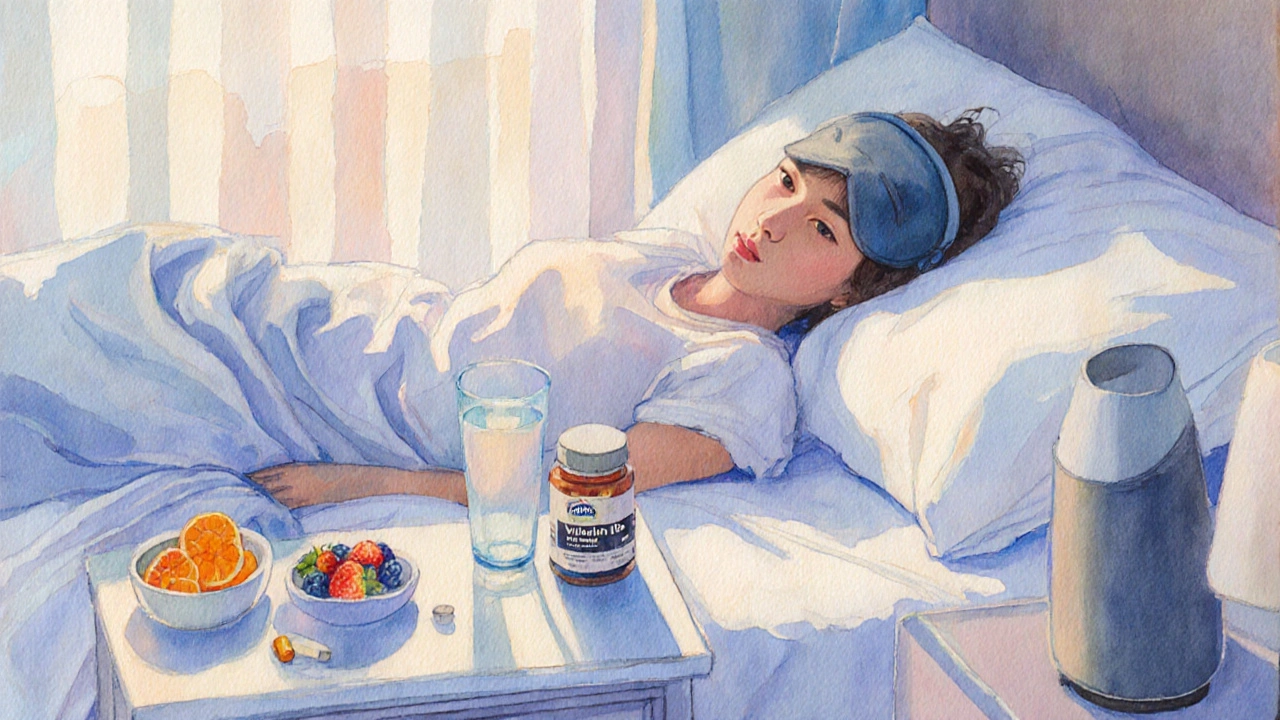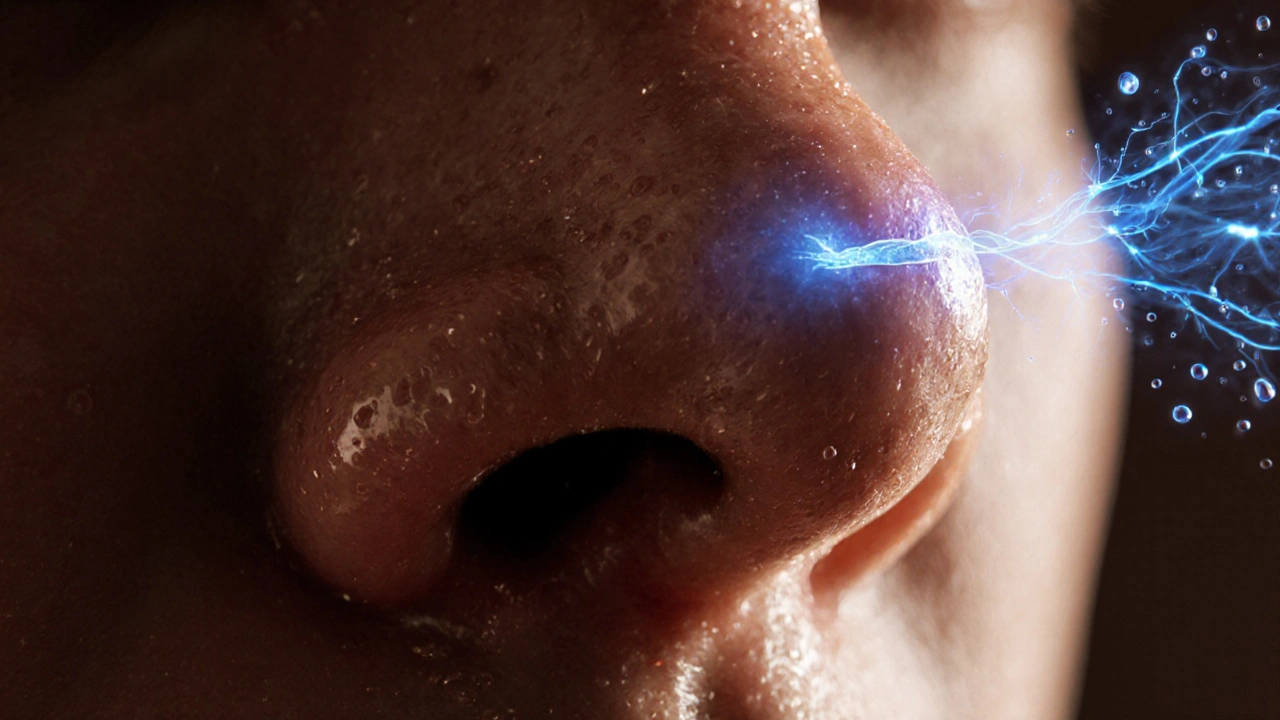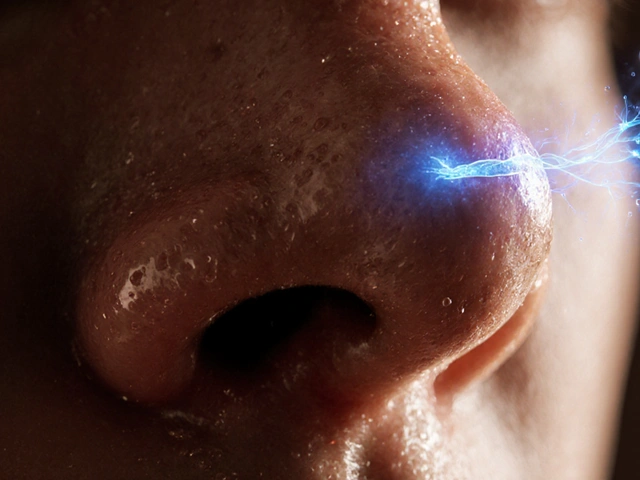Sneezing & Immune System Explorer
Allergic Triggers
IgE-mediated responses like pollen or dust mites
Pathogen Triggers
Viral infections like cold or flu
When irritants touch nasal lining, sensory nerves send signals to the brainstem. The brain triggers muscle contractions forcing air out at speeds up to 100 mph to clear particles and protect the respiratory tract.
Immune Response Pathways
- Histamine - Released during allergic reactions, increases nerve sensitivity
- Cytokines - Inflammatory signals that cause nasal swelling
- Antibodies - IgE in allergic individuals trigger mast cell degranulation
- Pollen IgE
- Dust Mites IL-5
- Pet Dander IgE
- Rhinovirus Interferons
- Influenza Cytokines
- Bacterial Infections Inflammation
Research-backed strategies to reduce unwanted sneezes:
- Get 7–9 hours of sleep nightly
- Eat a diverse, micronutrient-rich diet
- Stay hydrated to maintain mucus layer
- Manage stress levels
- Limit indoor allergens with HEPA filters
Every time you feel that sudden burst of air and tiny droplets shooting out of your nose, your body is doing more than just clearing out irritants - it’s putting the immune system to work. Understanding why sneezing happens, what it tells you about your defenses, and how to keep the reflex from becoming a nuisance can help you stay healthier year‑round.
Key Takeaways
- Sneezing is a reflex driven by the nervous system to expel unwanted particles from the nose and throat.
- The immune system releases histamine, cytokines, and antibodies that trigger the sneeze response.
- Allergens, viruses, and even environmental changes can set off the reflex, but the underlying mechanisms differ.
- Persistent or painful sneezing may signal infection, allergic rhinitis, or other medical issues that need attention.
- Supporting overall immunity with sleep, nutrition, and stress management reduces the frequency of unwanted sneezes.
How Sneezing Works
When an irritant touches the lining of the nose, sensory nerves in the nasal mucosa the moist tissue that lines the nasal passages and captures airborne particles send a signal to the brainstem. The brain then activates a rapid, coordinated contraction of the chest muscles, diaphragm, and soft palate, forcing air out at speeds up to 100 miles per hour. This powerful burst clears the offending particles and protects the lower respiratory tract.
The reflex is not a simple mechanical reaction; it’s tightly linked to the body’s immune surveillance. The moment a virus, bacterium, or allergen is detected, immune cells release chemicals that sensitize the nerve endings, making the sneeze response more likely.

Why the Immune System Triggers Sneezing
Three key players from the immune system often set the stage for a sneeze:
- Histamine a biogenic amine released by mast cells during allergic reactions binds to receptors on nasal nerves, increasing their excitability.
- Cytokines signaling proteins such as IL-1 and TNF‑α that coordinate inflammation can cause swelling of the nasal lining, narrowing the airway and prompting a sneeze to clear the blockage.
- Antibodies specifically IgE in allergic individuals, which bind to allergens and trigger mast cell degranulation lead to a cascade of histamine release.
In a viral infection like the common cold an upper respiratory tract infection caused by rhinoviruses and coronaviruses, infected cells release interferons that attract immune cells. The resulting inflammation also sensitizes the sneeze reflex, which is why a cold often comes with a barrage of sneezes.
Common Triggers: Allergens vs. Pathogens
| Trigger | Immune pathway | Typical symptom pattern |
|---|---|---|
| Seasonal pollen | IgE‑mediated mast cell activation → histamine release | Repeated sneezes, watery eyes, itchy throat |
| Dust mites | Chronic low‑grade inflammation, IL‑5‑driven eosinophils | Morning sneezing, nasal congestion, fatigue |
| Rhinovirus (cold) | Innate interferon response → cytokine surge | Sneezing, sore throat, runny nose, mild fever |
| Air pollutants (smoke, fumes) | Oxidative stress activates TRPA1 receptors | Single or occasional sneeze, throat irritation |
Notice the difference: allergic triggers rely heavily on IgE and histamine, while viral triggers engage broader cytokine networks. This distinction matters when you choose treatment - antihistamines work well for pollen, but they won’t stop a cold‑induced sneeze.

When Sneezing Signals a Problem
Most of the time, a few sneezes are harmless. However, certain patterns suggest you should see a clinician:
- Sneezing that lasts more than two weeks without a clear allergic or infectious cause.
- Accompanied by high fever, facial pain, or thick green mucus - possible sinusitis.
- One‑sided nasal discharge or persistent blood in the mucus - could indicate a nasal polyp or tumor.
- Severe itching, swelling, or hives after exposure to a new substance - risk of anaphylaxis.
Early diagnosis of conditions like allergic rhinitis, chronic sinusitis, or even early-stage upper‑airway cancers can prevent complications and improve quality of life.
Supporting Your Immune System to Reduce Unwanted Sneezes
While you can’t eliminate every sneeze, strengthening the overall immune balance helps keep reflexes in check. Here are practical steps backed by research:
- Prioritise sleep: 7‑9 hours nightly supports natural killer cell activity and keeps cytokine spikes in a healthy range.
- Eat a diverse, micronutrient‑rich diet: Vitamin C (80mg/day), zinc (10mg/day), and flavonoids found in berries blunt histamine release.
- Stay hydrated: Adequate fluid maintains the thin mucus layer, making it easier for the nose to clear irritants without over‑reacting.
- Manage stress: Chronic cortisol elevation suppresses antibody production and can worsen allergic responses.
- Limit indoor allergens: Use HEPA filters, wash bedding at 60°C weekly, and keep humidity below 50% to control dust mites.
- Consider targeted supplements: Quercetin (500mg twice daily) stabilises mast cells; probiotics (Lactobacillus rhamnosus) modulate gut‑associated immunity, indirectly reducing nasal inflammation.
For those with diagnosed allergies, a doctor may recommend intranasal corticosteroids or allergen immunotherapy, both of which have been shown to cut sneeze frequency by up to 70% after a few months of treatment.
Frequently Asked Questions
Why do I sneeze more when I step outside on a cold day?
Cold air dries the nasal lining, causing the nerves to become more sensitive. The body often reacts by triggering a sneeze to clear any particles that might have been trapped.
Can a single sneeze be a sign of a serious condition?
Rarely. Most isolated sneezes are benign. Serious concerns arise when sneezing is persistent, painful, or accompanied by other red‑flag symptoms such as high fever, nosebleeds, or facial swelling.
Do antihistamines stop sneezing caused by a cold?
Antihistamines target histamine‑driven reactions, so they are effective for allergies but have limited impact on viral‑induced sneezing, which is driven by cytokines rather than histamine.
Is it safe to use nasal decongestant sprays for frequent sneezing?
Short‑term use (up to three days) is generally safe, but prolonged use can cause rebound congestion and may worsen sneezing cycles.
How does allergen immunotherapy reduce sneezing?
Immunotherapy gradually desensitises the immune system to specific allergens, lowering IgE production and stabilising mast cells, which in turn reduces the frequency and intensity of sneezes over months of treatment.



Dominique Jacobs
October 8 2025Get enough sleep, folks, and your sneezes will thank you!
Claire Kondash
October 9 2025Imagine the humble sneeze as a tiny cosmic orchestra, each burst of air a note in the symphony of your immune defense.
When an irritant tickles the nasal lining, sensory nerves fire off signals that cascade through the brainstem, summoning muscles like a conductor cues musicians.
This reflex, far from being a mere inconvenience, is actually a frontline clean‑up crew sweeping debris out of the airway.
Histamine, cytokines, and antibodies each play distinct roles, akin to different sections of the orchestra harmonizing together.
In allergic seasons, IgE‑laden mast cells unleash histamine, turning the nasal passages into a hyper‑sensitive drum that beats faster and louder.
Viral invaders such as rhinoviruses trigger interferons, which act like a brass section blaring a warning that galvanizes the sneeze response.
The speed of the expelled air – up to 100 mph – is comparable to a race car accelerating in milliseconds, a testament to the body’s engineering marvel.
As you stand in a pollen‑laden field, the sheer number of particles can overwhelm the nasal sensors, prompting a cascade of sneezes that feel like applause.
Yet not all sneezes are created equal; a single, isolated sneeze on a cold day often signals dry air desiccating the mucosa, not an impending epidemic.
Nutrition also steps onto the stage – vitamin C, zinc, and flavonoids act as quiet background strings that moderate histamine release.
Hydration keeps the mucus layer supple, allowing the sneeze reflex to clear irritants efficiently without over‑reacting.
Stress, however, is the rogue percussionist that throws the whole performance off‑beat, elevating cortisol and amplifying inflammatory signals.
Simple lifestyle tweaks – regular sleep, balanced diet, and a HEPA filter – are like fine‑tuning your instrument, keeping sneezing in a healthy rhythm.
For those with chronic allergic rhinitis, targeted therapies such as intranasal corticosteroids or immunotherapy can silence the overactive chorus over time.
So next time you feel that inevitable “achoo,” remember you’re witnessing a sophisticated, immune‑driven concert, playing out in the millimeters of your nose. 😊
Matt Tait
October 9 2025Honestly, the whole “sneezing equals a healthy immune system” gimmick is overblown; most people just have a runny nose and call it science. Your body’s reflex is a basic protective reflex, not a miracle cure. Throwing in vague “get more sleep” advice feels like a lazy filler. If you want real impact, point readers to concrete studies instead of generic tips. Stop pretending a sneeze is a litmus test for overall health.
Benton Myers
October 10 2025Just a heads‑up: staying hydrated really does make the mucus thinner, which can cut down on the urge to sneeze constantly.
jennifer jackson
October 10 2025Keep smiling and take those sneezes in stride
Brenda Martinez
October 11 2025Behold! The sneeze is not merely a reflex-it is the body's battle cry against invisible invaders, a thunderous proclamation that the immune legion is mobilised! When histamine erupts, it is as if a war drum sounds, rallying every defender from mast cells to cytokines. The sheer force of expelled air, hurtling at unimaginable speeds, shatters the delicate fortress of the nasal mucosa, casting out pathogens like a furious tempest. Yet, in the midst of this chaotic ballet, we are reminded of our fragility; a single sneeze can herald the onset of a looming epidemic or the subtle whisper of allergy. Let us not dismiss this dramatic eruption; it is nature's way of declaring, “I am alive, and I will fight!”
Marlene Schanz
October 11 2025Yo, if u wanna keep sneezin down, try keepin ur bedroom clean – wash sheets hot, use a HEPA filter, and ditch the dusty rugs. Also, add some citrus or ginger in ur diet, it helps chill the inflammation.
Matthew Ulvik
October 12 2025💡 Great point! I’d add that consistent probiotic use can even help tone down that “battle cry” by balancing gut immunity, which in turn calms nasal inflammation. 😃
Dharmendra Singh
October 12 2025It’s worth noting that some traditional Ayurvedic practices recommend inhaling steam with a few drops of eucalyptus oil; this can moisten the nasal passages and reduce irritation without relying on pharmaceuticals.
Rocco Abel
October 12 2025While the “cosmic orchestra” analogy is poetic, let’s not ignore the hidden agenda: many over‑the‑counter antihistamines are merely placebos marketed by big pharma to keep us buying their endless stream of supplements.
Dawn Mich
October 13 2025Don't be fooled – the “immune orchestra” narrative is just another distraction from the fact that most sneezing triggers are engineered pollutants deliberately released to keep the population compliant.
Eric Sevigny
October 13 2025Absolutely, staying hydrated is key. I’ve found that drinking warm herbal tea with a pinch of turmeric before bed helps maintain mucus elasticity and reduces night‑time sneezing.
Glenda Rosa
October 14 2025In the grand tapestry of respiratory physiology, sneezing is the flamboyant splash of crimson thread that stitches together immunological vigilance and environmental chaos, a veritable fireworks display of histaminergic fireworks.
charlise webster
October 14 2025Overall, the article covers the basics well, though adding a quick reference chart for common triggers could improve readability.